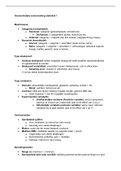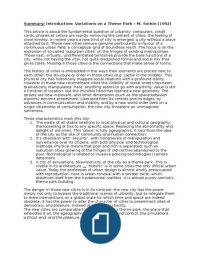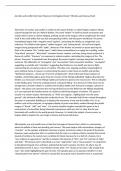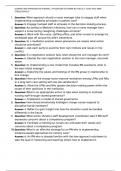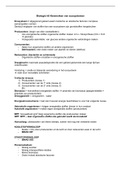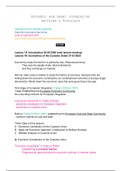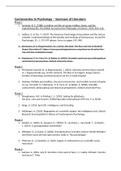Evaluate the view that changing norms and values have contributed to growing diversity in
personal and family life today. [20 marks]
Postmodernists argue that we live in an era where we are defined by choice and opportunities that
allow us to choose an identity and select a lifestyle are increasingly available. Individuals have
greater freedom to construct their own domestic arrangements; people can tailor their partnerships
and their families to meet their individual needs and to reflect their own identities. Beck argues that
we now live in a ‘risk society’ in which tradition has very low influence and people have more choice
in how family life can be structured. For example, within negotiated families, the roles are divided up
based on negotiation rather than conforming to patriarchal norms. As well as this, Giddens argues
that marriage is no longer conducted to find a partner who will meet the financial or emotional roles
within the family. Instead, a ‘pure relationship’ is sought to provide personal fulfilment and
satisfaction. The prevalence of the ‘pure relationship’ has meant that the expectations of married
couples are lowered and people can leave the relationship when there is no more confluent love.
Although these relationships are more equal than a patriarchal relationship, they are less stable and
predictable. This in turn can lead to more relationship breakdowns which also creates diversity in
family structure. This is because more stepfamilies and complex relationships such as the divorce-
extended family are created from the breakdown of these relationships.
Postmodernists also argue that the friends we choose are an increasingly important source of
personal relationships. Giddens sees same-sex couples as pioneers for new family types and equal
relationships. This is because same-sex relationships are not influenced by tradition to the same
extent as heterosexual relationships. This allows same-sex couples to develop relationships and
family types based on choice that serves their needs. For example, Weeks (1999) found that people in
the LGBTQ+ community form ‘chosen families’ often after facing rejection from their biological
families. Friendship networks functions as kinship networks for LGBTQ+ individuals. However, New
Right thinkers see homosexual relationships as a part of the breakdown of the family. This is because
they believe that the traditional patriarchal nuclear family is the natural family type; it is important
for children to have a stable home, with married mother and father, and that ideally the wife should
be able to stay at home to look after the children. The New Right argue that the decline of the
traditional family and the growth of family diversity are the cause of many social problems such as
higher crime rates and declining moral standards generally. Because of this, the New Right are
opposed to social policies that support alternative family types, like the Marriage Act 2013. Policies
that make it easier to adopt alternative family structures mean the nuclear family will no longer be
the dominant family type and will lose its value and significance in society.
Postmodernists would argue that the increase in individual choice has led to the decline in the typical
family. Cheal argues that the nuclear family is no longer stable and dominant. In 2021, there were
624,828 live births, an increase of 1.8% compared with 2020 (613,936). However, the number of live
births in 2021 is lower than the number of pre-coronavirus (COVID-19) births in 2019 and is in line
with the long-term trend of decreasing live births. This is because individuals focus on the meaning of
relationships rather than traditional norms and expectation of a family. For example, Tipper found
that many children though of their pets as a part of their family. As well as this, Giddens and Beck
argue that individuals make decisions by themselves for themselves. For example, Beck states: “the
standard biography of living has been replaced by the ‘do it yourself’ biography.” This indicates that
there is no longer a ‘correct’ way of living because there is no longer a structure for how an
individual’s life should be. Therefore, there should not be any limits on who is classified as family.
personal and family life today. [20 marks]
Postmodernists argue that we live in an era where we are defined by choice and opportunities that
allow us to choose an identity and select a lifestyle are increasingly available. Individuals have
greater freedom to construct their own domestic arrangements; people can tailor their partnerships
and their families to meet their individual needs and to reflect their own identities. Beck argues that
we now live in a ‘risk society’ in which tradition has very low influence and people have more choice
in how family life can be structured. For example, within negotiated families, the roles are divided up
based on negotiation rather than conforming to patriarchal norms. As well as this, Giddens argues
that marriage is no longer conducted to find a partner who will meet the financial or emotional roles
within the family. Instead, a ‘pure relationship’ is sought to provide personal fulfilment and
satisfaction. The prevalence of the ‘pure relationship’ has meant that the expectations of married
couples are lowered and people can leave the relationship when there is no more confluent love.
Although these relationships are more equal than a patriarchal relationship, they are less stable and
predictable. This in turn can lead to more relationship breakdowns which also creates diversity in
family structure. This is because more stepfamilies and complex relationships such as the divorce-
extended family are created from the breakdown of these relationships.
Postmodernists also argue that the friends we choose are an increasingly important source of
personal relationships. Giddens sees same-sex couples as pioneers for new family types and equal
relationships. This is because same-sex relationships are not influenced by tradition to the same
extent as heterosexual relationships. This allows same-sex couples to develop relationships and
family types based on choice that serves their needs. For example, Weeks (1999) found that people in
the LGBTQ+ community form ‘chosen families’ often after facing rejection from their biological
families. Friendship networks functions as kinship networks for LGBTQ+ individuals. However, New
Right thinkers see homosexual relationships as a part of the breakdown of the family. This is because
they believe that the traditional patriarchal nuclear family is the natural family type; it is important
for children to have a stable home, with married mother and father, and that ideally the wife should
be able to stay at home to look after the children. The New Right argue that the decline of the
traditional family and the growth of family diversity are the cause of many social problems such as
higher crime rates and declining moral standards generally. Because of this, the New Right are
opposed to social policies that support alternative family types, like the Marriage Act 2013. Policies
that make it easier to adopt alternative family structures mean the nuclear family will no longer be
the dominant family type and will lose its value and significance in society.
Postmodernists would argue that the increase in individual choice has led to the decline in the typical
family. Cheal argues that the nuclear family is no longer stable and dominant. In 2021, there were
624,828 live births, an increase of 1.8% compared with 2020 (613,936). However, the number of live
births in 2021 is lower than the number of pre-coronavirus (COVID-19) births in 2019 and is in line
with the long-term trend of decreasing live births. This is because individuals focus on the meaning of
relationships rather than traditional norms and expectation of a family. For example, Tipper found
that many children though of their pets as a part of their family. As well as this, Giddens and Beck
argue that individuals make decisions by themselves for themselves. For example, Beck states: “the
standard biography of living has been replaced by the ‘do it yourself’ biography.” This indicates that
there is no longer a ‘correct’ way of living because there is no longer a structure for how an
individual’s life should be. Therefore, there should not be any limits on who is classified as family.

